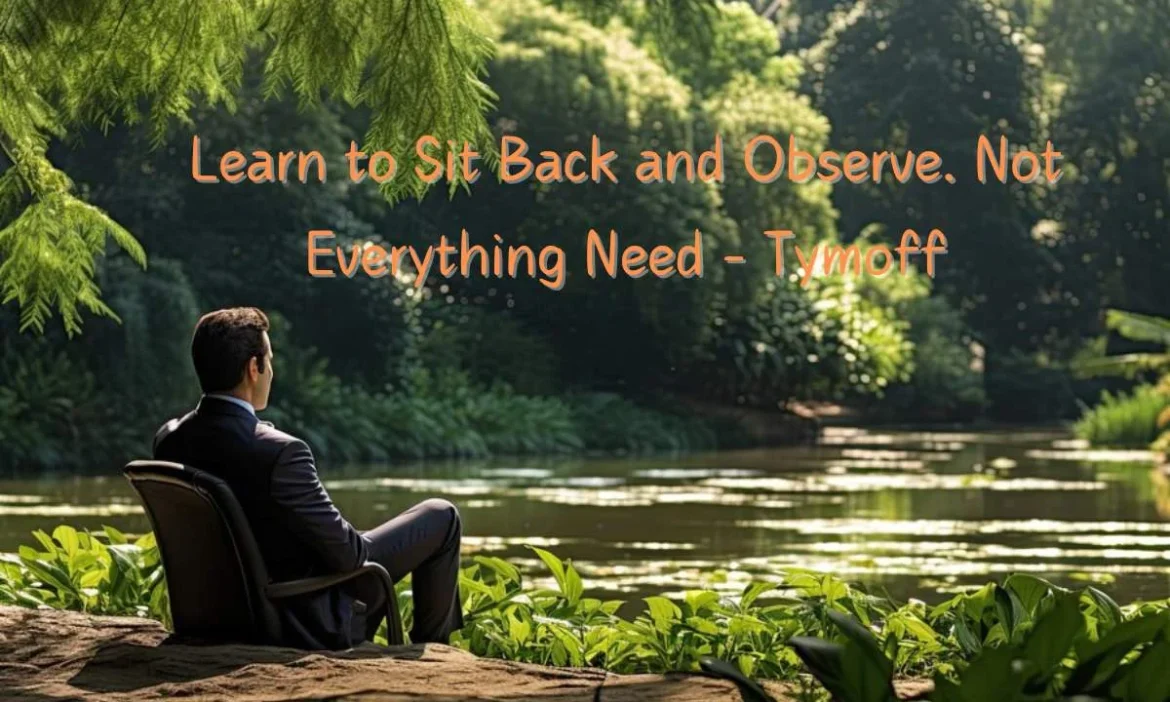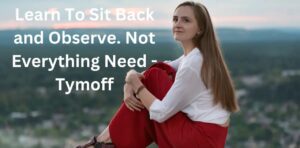
In our fast-paced, hyperconnected world, reacting quickly to everything around us has become the norm. We feel pressured to respond to every text, email, or social media post instantly. But what if the key to finding peace and understanding lies in the opposite approach —Learn to Sit Back and Observe. Not Everything Needs – Tymoff, and understands that not everything demands an immediate response. The phrase “learn to sit back and observe, not everything needs your reaction” attributed to Tymoff, serves as a powerful reminder of the importance of patience and mindfulness in our daily lives.
The Power of Observation
Learn to Sit Back and Observe. Not Everything Needs – Tymoff is not about passivity or indifference. It’s about being present and engaged with the world around us in a deeper, more thoughtful way. When we rush to react, we often miss crucial details, context, or the opportunity to reflect on the situation fully. Learn to Sit Back and Observe. Not Everything Needs – Tymoff Observation allows us to gather more information, assess situations more clearly, and approach challenges with a calm, rational mind.
Observation is a skill that many great leaders, thinkers, and creators have mastered. By taking the time to step back, they gain insights that others may overlook in their haste to react. This approach is especially important in today’s fast-paced world, where knee-jerk reactions can lead to misunderstandings, conflict, or unnecessary stress.
Why Not Everything Needs a Reaction
Many of the situations we encounter daily may trigger an emotional or immediate response. However, reacting to every situation can be mentally exhausting and counterproductive. Learn to Sit Back and Observe. Not Everything Needs – Tymoff Some things, especially small annoyances or external opinions, are not worth our energy. By reacting to everything, we become like a boat rocked by every wave, unable to chart a steady course.
There are several reasons why not everything deserves a reaction:
- Preserving Mental Energy: Constantly reacting to minor irritations or distractions depletes our mental and emotional resources. By choosing when to respond, we save our energy for the things that truly matter.
- Gaining Perspective: When we pause before reacting, we gain a clearer perspective. What seems like a big issue in the heat of the moment might be insignificant upon reflection.
- Avoiding Escalation: Immediate reactions, especially emotional ones, can escalate conflicts. Taking a step back allows us to respond more calmly and effectively, preventing unnecessary drama or tension.
- Fostering Inner Peace: By not feeling the need to react to everything, we cultivate a sense of peace and control over our own emotions. This leads to a more balanced and harmonious life.
Practical Ways to Practice Sitting Back and Observing
Adopting the practice of sitting back and obs Learn to Sit Back and Observe. Not Everything Needs – Tymoff erving in daily life requires mindfulness and self-awareness. Here are some practical steps to integrate this mindset:
- Pause Before Reacting: When you feel the urge to respond immediately, take a deep breath and pause. Ask yourself if this situation requires your reaction or if it’s something you can let go.
- Practice Mindfulness: Mindfulness helps in being fully present and aware of your thoughts, emotions, and surroundings without judgment. Regular mindfulness practice can make it easier to observe situations calmly before reacting.
- Focus on Listening: Instead of preparing your response while someone is talking, focus on truly listening. This not only helps you understand others better but also allows you to gather more information before responding.
- Learn to Let Go: Some things are beyond your control or simply not worth your time. Learn to let go of minor annoyances, unimportant opinions, or situations that don’t align with your values.
- Embrace Silence: Silence is often seen as uncomfortable, but it can be powerful. Sitting in silence allows us to process our thoughts more clearly and make more informed decisions.
Applying Tymoff’s Wisdom in Daily Life
The concept of Learn to Sit Back and Observe. Not Everything Needs – Tymoff is more relevant than ever in our digital age. Social media, news outlets, and the constant stream of notifications often urge us to react immediately, forming opinions and sharing them without fully understanding the context. However, by practicing restraint and observation, we can reduce stress, make better decisions, and live more peacefully.
Tymoff’s message is a call for self-awareness and the ability to differentiate between situations that require our attention and those that don’t. By doing so, we not only improve our own mental and emotional well-being but also foster better relationships and communication with those around us.
Strengthening Relationships Through Observation
 In our personal and professional relationships, Learn to Sit Back and Observe. Not Everything Needs – Tymoff before reacting can lead to healthier interactions. When we take a step back, we allow ourselves the opportunity to fully understand the perspectives of others. Many disagreements arise not from actual conflict but from miscommunication or a failure to listen. By practicing patience and observation, we create space for understanding.
In our personal and professional relationships, Learn to Sit Back and Observe. Not Everything Needs – Tymoff before reacting can lead to healthier interactions. When we take a step back, we allow ourselves the opportunity to fully understand the perspectives of others. Many disagreements arise not from actual conflict but from miscommunication or a failure to listen. By practicing patience and observation, we create space for understanding.
For example, Learn to Sit Back and Observe. Not Everything Needs – Tymoff instead of immediately jumping to conclusions during an argument, we can choose to observe both the situation and the emotions involved. Often, this simple act of pausing leads to more thoughtful responses and solutions that benefit both parties. It fosters empathy and allows us to engage in meaningful, rather than reactionary, communication.
Improving Decision-Making
In both personal and professional settings, impulsive decisions can lead to regret or unintended consequences. By sitting back and observing a situation fully before making a decision, we’re able to consider various factors, weigh potential outcomes, and make choices that align with our goals and values.
For instance, in the workplace, many challenges arise that demand quick decisions. Learn to Sit Back and Observe. Not Everything Needs – Tymoff While it’s sometimes necessary to act swiftly, not every situation requires immediate action. When we take the time to gather information and evaluate the situation with a calm mind, our decisions tend to be more strategic and beneficial in the long run. This reflective approach enables us to avoid unnecessary risks and make choices with clarity and confidence.
Building Emotional Resilience
One of the greatest benefits of Learn to Sit Back and Observe. Not Everything Needs – Tymoff without reacting is the emotional resilience it cultivates. By practicing mindfulness and allowing ourselves to process emotions before responding, we become less susceptible to the highs and lows of external events. This doesn’t mean ignoring or suppressing emotions, but rather giving ourselves the time to fully experience and understand them before taking action.
Over time, this practice leads to a greater sense of emotional stability. Instead of being at the mercy of our environment or the actions of others, we maintain control over how we respond. Learn to Sit Back and Observe. Not Everything Needs – Tymoff This emotional resilience is crucial in handling stress, conflict, and uncertainty, allowing us to navigate life’s challenges with grace and strength.
Cultivating a More Peaceful Life
Ultimately, Learn to Sit Back and Observe. Not Everything Needs – Tymoff advice invites us to cultivate a more peaceful and balanced life. By relinquishing the need to constantly react, we create space for tranquility and inner calm. Life’s minor irritations and distractions no longer hold the same power over us, and we become more attuned to what truly matters.
This approach also aligns with many spiritual and philosophical teachings, such as Stoicism and mindfulness practices, which emphasize the importance of controlling our reactions and focusing on what we can influence. In a world that often feels chaotic, this simple practice can be incredibly liberating.
Conclusion
The wisdom behind Learn to Sit Back and Observe. Not Everything Needs – Tymoff is timeless. In a world where immediacy and impulsiveness are often celebrated, the ability to pause, reflect, and observe stands out as a mark of emotional intelligence and maturity. By embracing this mindset, we not only reduce stress and improve our decision-making, but we also enhance our relationships and cultivate a deeper sense of peace.
Incorporating this practice into our lives may not happen overnight, but with consistent effort, we can learn to step back from the chaos, Learn to Sit Back and Observe. Not Everything Needs – Tymoff the world with clarity, and respond only when it truly serves us. Tymoff’s simple yet profound message is a powerful tool for anyone seeking to lead a more mindful, balanced, and purposeful life.
You May Also Read: TheJavaSea.me Leaks AIO-TLP


